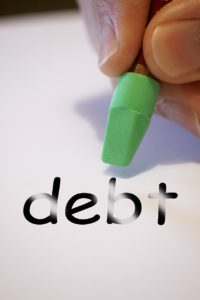
Bankruptcy gives people in debt a fresh start. Nancy L. Thompson Law Office, P.C. can help individuals and small businesses throughout Iowa with the four bankruptcy options: Chapters 7, 11, 12 and 13. Which of these options is best depends on goals, the type and amount of property and debts and the amount of income.
Chapter 7 Bankruptcy
 Sometimes called a “straight” bankruptcy, Chapter 7 is the type of bankruptcy most people think of when they consider filing bankruptcy. It’s fairly quick and, if there’s little property, often the best choice. Once the case is filed, an “automatic stay” immediately goes into effect. The stay means most lawsuits, repossessions, foreclosures, evictions, garnishments, utility shut-offs and other debt collection has to stop. Creditors can’t take further action without permission from the bankruptcy court. If the household income is below median income or the allow a debtor to pass a “means test”, Chapter 7 bankruptcy is probably the best choice.
Sometimes called a “straight” bankruptcy, Chapter 7 is the type of bankruptcy most people think of when they consider filing bankruptcy. It’s fairly quick and, if there’s little property, often the best choice. Once the case is filed, an “automatic stay” immediately goes into effect. The stay means most lawsuits, repossessions, foreclosures, evictions, garnishments, utility shut-offs and other debt collection has to stop. Creditors can’t take further action without permission from the bankruptcy court. If the household income is below median income or the allow a debtor to pass a “means test”, Chapter 7 bankruptcy is probably the best choice.
In Iowa, even in Chapter 7 bankruptcy debtors can usually exempt or keep most or all of their property. Most retirement accounts, pensions and homesteads are exempt. Other secured property, such as cars, may not have any equity, meaning debtors can keep it also. The trustee appointed to administer the case may liquidate non-exempt property and use the proceeds to pay creditors. But debtors can usually negotiate with trustees to even keep non-exempt property by paying a portion of the non-exempt amount. Once the Chapter 7 case is over the debts are discharged. The discharge prevents creditors from collecting debts. Creditors can’t call, write, sue or take any steps that could be considered an attempt to collect debts. If debtors want to keep property that has a lien on it payments have to be kept current. Some debts, like child support, alimony and criminal restitution can’t be discharged. Some taxes and student loans also can’t be discharged but there are exceptions so if taxes or student loans are owed be sure to contact us about the options.
Chapter 11 Bankruptcy
Most people think of Chapter 11 as the bankruptcy option for big corporations like General Motors or United Airlines. But individuals can file Chapter 11 also, and for some people it may be the only or best choice. Some people may have debt that exceeds the amount of debt allowed in a Chapter 13 bankruptcy, leaving Chapter 11 as the only option to reorganize debt. Chapter 11, while more complex and more expensive than other bankruptcy options, also includes some additional features that might benefit consumers, such as the ability to stretch default amounts on secured debt payments beyond what’s possible in Chapter 13. Trustee fees might also be lower in a Chapter 11. If debt needs to be restructured but Chapter 13 isn’t an option be sure to contact us about how Chapter 11 might help.
Chapter 12 Bankruptcy
 The “family farmer bankruptcy,” Chapter 12 is available for farmers seeking to restructure debts. Filing Chapter 12 might allow farmers to lower interest rates, stretch out loan terms or write off unsecured debt. In general, the plan of reorganization in a Chapter 12 must provide all creditors the same amount of money they would receive in a Chapter 7 bankruptcy. Secured creditors are paid over a period of years, perhaps less than the current debt and over a longer period of time and at a lower interest rate, depending on the current loan terms.
The “family farmer bankruptcy,” Chapter 12 is available for farmers seeking to restructure debts. Filing Chapter 12 might allow farmers to lower interest rates, stretch out loan terms or write off unsecured debt. In general, the plan of reorganization in a Chapter 12 must provide all creditors the same amount of money they would receive in a Chapter 7 bankruptcy. Secured creditors are paid over a period of years, perhaps less than the current debt and over a longer period of time and at a lower interest rate, depending on the current loan terms.
If a creditor is fully secured, no write-down of debt is usually possible but a farmer might be able to restructure the loan with a longer amortization or a lower interest rate. Unsecured creditors might receive payments if the farmer has “disposable income” (gross income minus all living and operating expenses) during the 3-5 years following the filing of the bankruptcy. The timing of a Chapter 12 bankruptcy can be critical to making reorganization successful so it’s important to contact us as soon as debt problems arise.
Chapter 13 Bankruptcy
 Available to any individual, including farmers (but not to corporations or LLCs), Chapter 13 allows debtors to repay creditors a portion or all of the debt owed. Secured creditors are paid in full or the value of the collateral securing a loan. Unsecured creditors are often paid just a small portion of the debtors’ “disposable income” over a 3 to 5 year period (depending on whether a debtor is above or below median income). Disposable income is the net income after living and any business operating expenses are deducted.
Available to any individual, including farmers (but not to corporations or LLCs), Chapter 13 allows debtors to repay creditors a portion or all of the debt owed. Secured creditors are paid in full or the value of the collateral securing a loan. Unsecured creditors are often paid just a small portion of the debtors’ “disposable income” over a 3 to 5 year period (depending on whether a debtor is above or below median income). Disposable income is the net income after living and any business operating expenses are deducted.
Catching up past due mortgage payments, taxes and child support obligations are often the reason Chapter 13 bankruptcy is filed.
It may also be possible to strip off mortgages on real estate, cram down secured debts to the value of property and pay secured debts at a lower interest rate. Debtors with substantial disposable income may also need to file Chapter 13 bankruptcy to receive a discharge of debts.Nancy L. Thompson Law Office, P.C. has Spanish language bankruptcy information available if needed.


